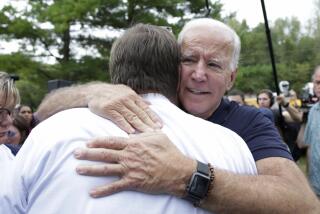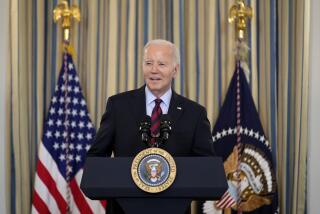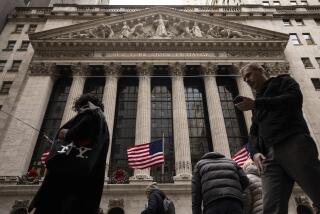Obama expects harder times
President-elect Barack Obama warned Sunday that the nation’s economic problems were “going to get worse before they get better,” pointing to the fragility of the financial system and to recent numbers showing the U.S. with its highest unemployment rate in 15 years.
He later sought to balance the stark assessment with optimism about the economy’s future as he voiced support for a newly proposed government bailout of the nation’s carmakers that would be tied to restructuring and a push for greater fuel efficiency.
In comments a day after he proposed a massive public works program, Obama said Congress was doing the “exact right thing” by rapidly responding to the automotive crisis while holding the industry’s “feet to the fire.”
Speaking in a taped interview on NBC’s “Meet the Press,” Obama seemed to be trying to brace the nation for tougher economic times. But at a news conference in Chicago later Sunday, he tempered his remarks with a dose of optimism.
“I am absolutely confident that if we take the right steps over the coming months that not only can we get the economy back on track, but we can emerge leaner, meaner and ultimately more competitive and more prosperous,” he said.
Pressed by NBC’s Tom Brokaw, Obama said his economic advisors were still “crunching the numbers” for a post-inauguration economic stimulus package. In a weekend radio address, he said the package would include a massive public works program to build roads and other infrastructure projects.
--
A needed ‘infusion’
Some Republicans have said the stimulus plan would be far too expensive. But Obama said it was more important to spend money to revive the economy and create jobs than worry about the short-term effect on the national debt.
“We have to provide a blood infusion to the patient right now to make sure the patient is stabilized,” he said.
Obama said the full scope of the economic pain was only starting to come into focus, noting the more than 500,000 jobs that were lost in November.
“These aren’t just abstract numbers,” he said at the news conference. “They ripple throughout the economy, and people are really suffering, which is why we’ve got to act swiftly and boldly.”
Obama said he thought the Bush administration understood the severity of the problem, but he said there had been a lack of “aggressive steps” in the housing market to stem foreclosures.
Criticized for staying on the sidelines until now, Obama for the first time voiced support for auto industry bailout legislation being drafted in Congress.
He said it would be unacceptable to allow the U.S. auto industry to fail during a time of growing unemployment, although he was less definitive on whether some auto executives should lose their jobs.
“If this management team that’s currently in place doesn’t understand the urgency of the situation and is not willing to make the tough choices and adapt to these new circumstances, then they should go,” he said.
Sen. Christopher J. Dodd (D-Conn.), chairman of the banking committee, said on CBS’ “Face the Nation” that General Motors Chief Executive Rick Wagoner “has to move on” as part of a government-run restructuring.
“I think you have got to consider new leadership,” Dodd said.
House and Senate aides are still working on details of the bailout plan, which Democratic leaders have said they hope to pass this week.
As he has since his election, Obama sidestepped a question about whether he intended to immediately fulfill a campaign pledge to raise taxes on Americans earning more than $250,000 a year, or whether he would wait until a tax reduction for those earners expired in 2011.
He also declined to say whether he backed Caroline Kennedy, daughter of President Kennedy, as the replacement for Sen. Hillary Rodham Clinton (D-N.Y.) after Clinton’s expected appointment as secretary of State.
“The last thing I want to do is get involved in New York politics,” he said on “Meet the Press.” “I’ve got enough trouble in terms of Illinois politics.”
--
Adding to his team
Obama’s network appearance came as he moved to bring into his administration one of the military’s most visible critics of the Bush administration’s Iraq war strategy.
The formal announcement of retired Gen. Eric K. Shinseki, 66, as his pick for secretary of Veterans Affairs fell on the anniversary of the attacks on Pearl Harbor in 1941. Both Obama and Shinseki were born in Hawaii.
“For many of today’s troops and their families, the war does not end when they come home. Far too many are suffering from the signature injuries of the wars in Iraq and Afghanistan,” Obama said.
“We have a sacred trust to repay a favor, the favor that they have done us.”
As Army chief of staff from 1999 to 2003, Shinseki clashed with Defense Secretary Donald H. Rumsfeld. Relations further soured in February 2003, when Shinseki testified to Congress that it might take several hundred thousand U.S. troops to control violence in Iraq after the invasion.
Rumsfeld dismissed that estimate as “wildly off the mark,” and Shinseki was gone within months. Many think President Bush’s “surge” strategy in the last year vindicated Shinseki.
The first Japanese American Army four-star general, Shinseki will add diversity to Obama’s Cabinet. He will oversee one of the federal government’s largest agencies and one that has come under significant criticism in recent years over the treatment of veterans returning from Iraq and Afghanistan.
“I can think of no higher responsibility than ensuring that men and women who have served our nation in uniform are treated with the care and respect that they have earned,” said Shinseki, the recipient of two Purple Hearts during his service in Vietnam.
Obama, meanwhile, was asked to respond to recent news stories in which gun dealers have said that sales have surged since the election because people fear it will be harder to get weapons under the new administration.
“I believe in common-sense gun safety laws and I believe in the 2nd Amendment,” he said.
“So lawful gun owners have nothing to fear. I’ve said that throughout the campaign. I haven’t indicated anything different during the transition. And I think that people can take me at my word.”
--
peter.wallsten@latimes.com
--
John McCormick reporting from Chicago
Peter Wallsten reporting from Washington
More to Read
Get the L.A. Times Politics newsletter
Deeply reported insights into legislation, politics and policy from Sacramento, Washington and beyond. In your inbox three times per week.
You may occasionally receive promotional content from the Los Angeles Times.






